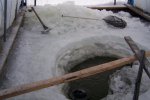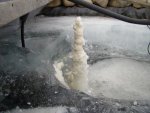crsublette
coyotes call me Charles
Yep, that is why I would want to warm it to 60*F~65*F or higher, instead of 50*F. Warmer is always better since you don't even have to begin thinking about all this craziness. Warmer prevents the roller coaster to start in the first place. Yeah, if I had the resources, then I would want the roller coaster to never start or take the koi inside if I had the means or desire.
Unfortunately, I am just going to roll with the punches in my watergarden and hope for the best when Spring comes around.
The article does give good advice about salt and affects of water temperature.
Unfortunately, I am just going to roll with the punches in my watergarden and hope for the best when Spring comes around.
The article does give good advice about salt and affects of water temperature.




